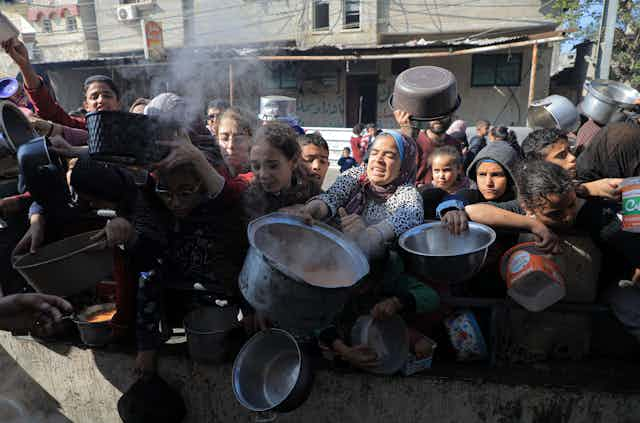As the casualty count on the Gaza Strip approaches 32,000 people, in itself a terrible and distressing statistic, another number also stood out this week. It is reported that in the past week, more than 100 aid workers have been killed. Twenty-three on March 19 as they waited at the Kuwait roundabout in Gaza City to receive an aid convoy, but others in raids which have reportedly focused on aid distribution centres and warehouses, according to the Middle East Monitor.
In a situation such as the one unfolding in Gaza, with millions facing critical shortages of food, fuel and medicines, aid agency staff are precious frontline workers. They perform the vital – and very dangerous – task of coordinating aid distribution to 2 million desperate people. Like medical staff in a conflict situation, they are protected by the Geneva conventions.
As always against the background of a chaotic and politically sensitive conflict, it should be noted that these reports – like the overall death toll reports – originate with the authorities in Gaza and must be treated with due caution. But UNRWA, the United Nations relief agency for Palestinian refugees, reports that 165 of its workers have been killed in the five months of the conflict.
This is complicated by Israel’s claims that UNRWA workers were involved in the vicious October 7 attacks on Israel by Hamas, leading it to go so far as calling UNRWA an active participant in the conflict on the side of Hamas – although so far it has offered no evidence to support these claims. Despite this, the agency – which has an estimated 13,000 workers in Gaza – has had its funding paused by several countries, including the US and UK.

Gaza Update is available as a fortnightly email newsletter. Click here to get our updates directly in your inbox.
All of which makes for distressing viewing on the nightly news. It’s fair to say that in many western countries – judging by the massive and regular protests calling for a ceasefire and humanitarian intervention in Gaza – the views of significant numbers of people are out of sync with the actions of their political leaders.
Which sets up an interesting dynamic in an election year for the US. Last week, a speech by Chuck Schumer, a senior Democrat who is the US Senate majority leader and a vociferous, longtime supporter of Israel – and, until recently at least, friend of its prime minister, Benjamin Netanyahu – called for Netanyahu to resign and make way for an election, adding:
Nobody expects Prime Minister Netanyahu to do the things that must be done to break the cycle of violence, to preserve his credibility on the world stage, to work to a two-state solution.
Schumer’s boss, Joe Biden, commented that he had made “a good speech”, adding that: “I think he expressed a serious concern shared not only by him but by many Americans.”
But, as John Strawson – an expert in Israeli politics at the University of East London – writes here, all indications are that this is highly unlikely. Manoeuvrings inside Netanyahu’s ruling coalition, Strawson believes, have actually shored up the prime minister’s position when compared with his main rival Benny Gantz.
Schumer also called for the Palestinian Authority to make changes at the top to usher in “a new generation of Palestinian leaders who will work towards attaining peace with a Jewish state”. But this looks highly unlikely too, given that the PA president, Mahmoud Abbas, has just appointed a decidedly old-school prime minister: Muhammad Mustafa is a 69-year-old political ally who hardly represents a new generation of leadership.
Schumer’s speech also bears examination for what it tells us about Washington’s attitude towards the Israeli government – at least on the Democrat side. As Dov Waxman, professor of Israel Studies at the University of California, Los Angeles, tells Naomi Schalit, political editor of The Conversation US, Schumer’s speech marks “the culmination of a process that’s been underway for some time, whereby the Democratic Party has increasingly turned against Netanyahu”.
In this illuminating interview, Waxman sets out the nuances in the speech which, he believes, was aimed as much at a domestic audience of Democrat voters as at Israelis, Palestinians or the watching international community, with Schumer deliberately positioning the Democrats as pro-Israel but against the Netanyahu government and what it is doing in Gaza.
Hidden in the speech was a key phrase warning that if this goes on much longer, it will force the Biden administration to “play a more active role in shaping Israeli policy by using our leverage to change the present course”. By this, says Waxman, Schumer means that US military aid to Israel could be on the line. Now that would be a game-changer.
Read more: Pro-Israel but anti-Netanyahu: Democratic Party leaders try to find the middle ground
By sea? By air?
As you would expect, Biden made Gaza one of the key segments of his recent State of the Union address. With a view to voters on both sides of the spectrum, he apportioned blame carefully, noting that the conflict had begun with the Hamas assault on October 7 but adding that the overwhelming majority of the victims of Israel’s reprisal operation in Gaza have been innocent civilians.
Declaring that “it’s heartbreaking”, Biden announced that he had instructed the US military to build a temporary pier in the Mediterranean to enable the delivery of aid by sea. “No US boots will be on the ground,” he noted, adding that the pier would enable a “massive increase in the amount of humanitarian assistance getting into Gaza every day”.
But Foteini Stavropoulou of Liverpool John Moores University and Sarah Schiffling of Hanken School of Economics – both experts in aid distribution – believe this will fall far short of the capacity required to meet the urgent needs of the starving population of Gaza. Here, they outline six steps which could help get the required volumes of humanitarian aid into the besieged enclave.
There have been airdrops of aid over the past weeks. Stavropoulou and Schiffling believe this is a delivery option of last resort, but for 12 months from 1948, the US and UK maintained an airlift into blockaded west Berlin, feeding more than 2 million people cut off by Soviet forces.
Claudia Milena Adler, an expert in humanitarianism with the University of York, and Abdullah Yusuf, an expert in international relations at the University of Dundee, compare what was achieved during the Berlin airlift with what is required now, and ask whether the west can perform the same miraculous service in Gaza.
They are not optimistic. Feeding Berlin in 1948 took a clear effort of political will and western unity to achieve. It’s far from clear, they write, that the same political will exists today when it comes to Israel and Palestine.
Ramadan in Rafah
Back in January, the aforementioned Benny Gantz – a member of Israel’s war cabinet – said that unless all hostages were released, the Israel Defense Forces (IDF) would commence an assault on the city of Rafah by March 10 – which would coincide with the start of Ramadan. This, as the director of the Middle East Institute’s program on Palestine, Khaled Elgindy, said at the time, “adds a layer of distastefulness and outrage to an already pretty horrendous situation”.
In the event, the assault has not begun. Now we have a situation where almost daily, Biden and other senior world leaders warn Israel not to go into Rafah – where more than a million Palestinian refugees from the rest of the Gaza Strip are huddling and close to starvation. Meanwhile, Israel doubles down on its insistence that it still plans to carry out the assault.
Carlo Aldrovandi, a professor in international peace studies at Trinity College Dublin, explains the significance of Ramadan, not only to the 2 million Palestinians trapped in Gaza but the wider Islamic world. And he warns that Islam’s holiest month could see increased violence on the West Bank, where tensions remain high.
Read more: Israel-Hamas conflict: Ramadan brings fresh fears of escalation on both Gaza Strip and West Bank
Gaza Update is available as a fortnightly email newsletter. Click here to get our updates directly in your inbox.

